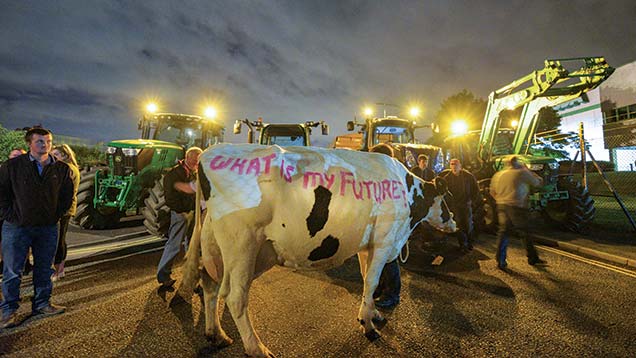Supermarkets must leave farmers out of throat-cutting policies
 © Michael Scott/Demotix/Corbis
© Michael Scott/Demotix/Corbis Farmers Weekly asked industry leaders to give their views on the dairy crisis and how it could be solved. Johann Tasker reports.
Retailers have to accept they must fairly share risk and reward with milk producers, say industry experts. But government ministers, farm leaders and producers themselves have major parts to play when they meet to secure a sustainable future for Britain’s dairy sector on Monday (17 August).
Nick Holt-Martyn, principal consultant with the Dairy Group dairy consultancy, says: “Retailers should pay a more sustainable price for all UK dairy products – not just liquid milk – and leave farmers out of their throat-cutting policies.”
See also: Farmers react to Morrisons’ 10p extra Milk For Farmers
Dan Crossley, executive director of the Food Ethics Council, agrees that supermarkets have a moral obligation to reward farmers properly for milk in a way that reflects the true production cost. The government has an important role in ensuring that contracts are fair, he believes. Mr Crossley says: “The government should take steps to encourage food companies to provide greater transparency about profit margins along supply chains. That would allow the public to make more informed purchasing decisions.”
Amanda Ball, head of communications at AHDB Dairy, says this week’s decision by Morrisons to introduce new milk brand paying 10p/litre extra to farmers will enable shoppers to make a conscious decision when buying milk from the supermarket chain. But Ms Ball says it is still important to communicate the value of British dairying to consumers.
“We need to ensure that we are competitive, so that we are in the game,” she says. “Then we have to give the public a reason to buy British produce, and make it easier to identify on the shelf.”
The NFU says Defra needs to accept that something has gone fundamentally wrong in the supply chain and take remedial action. It wants government action to ensure contracts to all farmers are longer term and fairer in apportioning risk and reward.
NFU president Meurig Raymond says: “The government also needs to urgently ensure that rules are put in place regarding labelling so that it is clear and obvious which products are imported and which are British.”
Mr Raymond adds: “We are all looking for government to ensure that British products are marketed abroad and that new markets are opened up for our high-quality British food.”
Scottish rural affairs minister Richard Lochhead has pledged to leave “no stone unturned” to ensure primary food production is protected in each UK country. “We need to urgently consider what further appropriate help can be made available to those sectors most affected,” he says.
NFU Scotland president Allan Bowie says any repercussions of the crisis and those leaving the sector extend far beyond dairying. The UK government must accept that a dysfunction supply chain is having a severe impact both on the balance of trade, he says.
Dairy farming is a long-term commitment, high cost and challenging, points out Mr Bowie. Evidence proves that very few farmers return to the industry once they stop milking cows. “This is a national asset that we cannot afford to undervalue,” he says.
NFU Cymru president Stephen James, who is himself a First Milk supplier, describes the situation in Wales as “pretty desperate”. The lack of money being spent by cash-strapped farmers is having an impact on the rural economy beyond agriculture, he says.
“The impact of low retail milk prices put in place by supermarkets to get customers through the door is having an impact on the entire supply chain because garage forecourts and corner shops are selling milk cheaply, too. We need to get prices back up.”
Dairy UK chief executive Judith Bryans says an urgent review of the EU intervention price is needed to put a floor in the market. There also needs to be strong sustained education and consumer promotion around the benefits of consuming dairy products, she adds.
Dr Bryans says: “The current intervention price is far too low to be helpful. We all recognise that volatility is now an inherent part of the milk market – and we must focus on effective ways to mitigate its impact on the UK dairy industry.”
Ulster Farmers’ Union president Ian Marshall and Northern Ireland agriculture minister Michelle O’Neill have already met Defra secretary Liz Truss to underline the widely held belief that the UK government should press Brussels to review the intervention price for dairy products.
Mr Marshall says: “With farmgate prices well below the cost of production, and with no sign of recovery, we need the secretary of state’s commitment to ensuring the industry is supported through the crisis it is facing this autumn and winter.”
Topping the agenda should be how best to address the major cashflow and profitability issues facing all farmers. “It’s important to remember that while the dairy sector has grabbed the headlines in recent weeks, what we are in fact facing is a crisis across the entire farming industry.”
